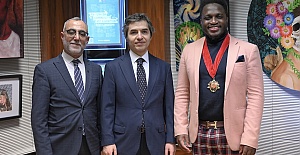The Security Council adoption of Resolution 186, and the subsequent sending of a peacekeeping force to Cyprus on March 4, 1964, was a landmark decision at the time and it has proved to be the longest single deployment of UN forces in the history of the organization. The eminent Turkish Cypriot journalist, Yusuf Kanli recently described the UN deployment as “The UN’s professional tourist force! in a recent article of his upon this subject. He is not alone in that assessment of UNFICYP. Some while ago, the late RR Denktas recalled Archbishop Makarios similarly describing the UN thus: “Ah, the UN” said Makarios. “My permanent tourists; they bring a healthy income you know!” During the ensuing half-century since 1964, every six months, the UN vote to continue the deployment yet this has failed to deliver an equitable solution, just as it failed to prevent the acts of genocide perpetrated under the auspices of both the Greek Cypriot government and the Orthodox Church and furthermore, partly due to a poorly worded mandate and partly due to pro-Greek Cypriot bias on the part of the UN, the latter have generally been more supportive of the Greek side than that of a shared power agreement with equal parties thereto.
The background to UNFICYP can be summarised thus: The Republic of Cyprus became an independent state on 16 August 1960, and a member of the United Nations one month later. The Constitution of the Republic, which came into effect on the day of independence, was intended to balance the interests of both the Greek Cypriot and the Turkish Cypriot communities. Cyprus, Greece, Turkey and the United Kingdom entered into a treaty to guarantee the basic provisions of the Constitution and the territorial integrity and sovereignty of Cyprus. The application of the provisions of the Constitution however, encountered difficulties from the very beginning and led to a succession of constitutional crises. The accumulated tension between the two communities resulted in the outbreak of violence on the island from 21 December 1963 and onwards. On 27 December, the Security Council met to consider a complaint by Cyprus charging intervention in its internal affairs and aggression by Turkey. Turkey maintained that Greek Cypriot leaders had tried for more than two years to nullify the rights of the Turkish Cypriot community and denied all charges of aggression.
By 15 February 1964, after all attempts to restore peace on the island had failed, the representatives of the United Kingdom and of Cyprus requested urgent action by the Security Council. On 4 March 1964, the Council unanimously adopted resolution 186 (1964), by which it recommended the establishment of the United Nations Peacekeeping Force in Cyprus (UNFICYP). The Force became operationally established on 27 March 1964.
The mandate of UNFICYP was originally defined in the following terms: "…in the interest of preserving international peace and security, to use its best efforts to prevent a recurrence of fighting and, as necessary, to contribute to the maintenance and restoration of law and order and a return to normal conditions." That mandate, which was conceived in the context of the confrontation between the Greek Cypriot and Turkish Cypriot communities in 1964, has been periodically extended by the Security Council ever since.
The coup d'état (Colonels Coup) in Cyprus on 15 July 1974 by Greek Cypriot and Greek elements favouring union with Greece was followed by wholly justifiable military intervention by Turkey, whose troops ultimately established Turkish Cypriot control over the northern part of the island, although following the Atilla 2 Operations they held considerably more of the island until Ecevit conceded to Henry Kissenger and pulled the Intervention Forces to the North of the Green Line. The Security Council called for a ceasefire and laid the basis for negotiations between Greece, Turkey and the United Kingdom. A de facto ceasefire came into effect on 16 August 1974. Apart from occasional skirmishes, the status quo has subsisted ever since.
The latest attempt to find a comprehensive settlement of the Cyprus problem was launched under United Nations auspices in September of 2008. The end goal of the talks has been agreed between the Parties and endorsed by the Security Council: a bizonal, bi-communal federation, with political equality and a single international personality. Due to the powerful presence residual nationalism in some sectors of the Greek Cypriot side, with surviving veterans of the 55-59 EOKA (terrorist) organization adding their Drachma to the rhetoric, there seems but a dim hope for a settlement to the Cyprus Question and in a final assessment of UNIFCYP, the peace that has maintained since 1974 is due solely to the ongoing presence of the TSK against whom neither the Greek Cypriots nor the Greeks have any credible answer.


 Prime Minister Keir Starmer's 2025 Easter message
Prime Minister Keir Starmer's 2025 Easter message After Nesil Caliskan a by-election will be held in Jubilee ward in Enfield
After Nesil Caliskan a by-election will be held in Jubilee ward in Enfield Publishing the analysis, Labour’s Cllr Ergin Erbil said Everybody in Enfield deserves basic rights
Publishing the analysis, Labour’s Cllr Ergin Erbil said Everybody in Enfield deserves basic rights Gaza-Israel conflict Statement from Cllr Ergin Erbil, Leader of Enfield Council
Gaza-Israel conflict Statement from Cllr Ergin Erbil, Leader of Enfield Council The European Union called on Turkey to uphold democratic values
The European Union called on Turkey to uphold democratic values Turkish citizens in London said Rights, Law, Justice
Turkish citizens in London said Rights, Law, Justice The Council of Turkish Cypriot Associations Geneva response letter
The Council of Turkish Cypriot Associations Geneva response letter Sustainable Development and ESG, Will This Become the Course for Turkic World
Sustainable Development and ESG, Will This Become the Course for Turkic World The 'Prince of Paris' has impressed in his first EuroLeague season
The 'Prince of Paris' has impressed in his first EuroLeague season Saran Media And Euroleague Basketball Extend Media Rights Partnership for Four More Years
Saran Media And Euroleague Basketball Extend Media Rights Partnership for Four More Years Will Rangers be Jose Mourinho’s next victim?
Will Rangers be Jose Mourinho’s next victim? Jose Mourinho's Fenerbahce face Rangers on Thursday
Jose Mourinho's Fenerbahce face Rangers on Thursday Barclays has become the biggest UK lender so far to cut mortgage rates
Barclays has become the biggest UK lender so far to cut mortgage rates THE SPRING STATEMENT EXPLAINED, UK ECONOMIC OUTLOOK AND GROWTH FORECASTS
THE SPRING STATEMENT EXPLAINED, UK ECONOMIC OUTLOOK AND GROWTH FORECASTS Launch of Made in Enfield gift shop to celebrate local artists and designers
Launch of Made in Enfield gift shop to celebrate local artists and designers Trial used smart Wi-Fi sensors for live building occupancy data to optimise
Trial used smart Wi-Fi sensors for live building occupancy data to optimise
















